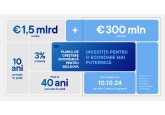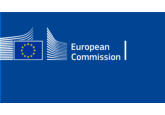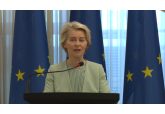
Siegfried Muresan has been appointed co-rapporteur of the European Parliament on the 1.8 billion-euro Economic Growth Plan for Moldova
He announced this on his social media page. The MEP, co-chairman of the Parliamentary Committee for the Moldova-EU Association and chief negotiator of the European Parliament on the future multiannual budget of the European Union named the priorities in the upcoming negotiations on the said plan, noting that, first of all, it is necessary to adopt the European legislation of the plan as soon as possible, so that the money reaches Moldova in the shortest time possible. “Secondly, it is equally important to adopt a support package on good conditions for Moldova, which takes into account the situation in the country and its development needs. Last but not least, I want to make sure that the EU provides Moldova with adequate technical assistance, so that it can absorb these funds,” Siegfried Muresan said. He recalled that the new EU support package for Moldova totaling 1.8 billion euros, announced by European Commission President Ursula von der Leyen in Chisinau last week, is for 3 years and will finance investments in hospitals, roads, bridges over the Prut River, as well as in other fields that should lead to Moldova's modernization, improve the living standards of the population and prepare the country for joining the European Union. Earlier it was reported that the EU took a huge step to support Moldova's development and the European Commission approved an unprecedented financial package worth 1.8 billion euros. The Economic Growth Plan for Moldova is part of an ambitious support project designed to accelerate Moldova's accession to the EU, while strengthening the country's ability to implement crucial reforms and boost the national economy. The financial assistance, which runs from 2025 to 2027, will be the most important economic support provided by the EU to Moldova since independence. European Commission head Ursula von der Leyen emphasized that the aid package could “lead to a doubling of the size of the Moldovan economy within a decade”, this will happen as a result of investments in jobs, infrastructure and services. The financial support is based on 3 leading components, each of them directly contributes to the reform and modernization of the country. It is primarily about increasing financial assistance and modernizing infrastructure. This component of the package focuses on supporting the necessary structural reforms and modernization of the national infrastructure. A significant portion of these funds will be allocated for the construction and improvement of transport infrastructure, including roads, bridges and railroads. Notable examples of projects to be financed include the construction of a new ring road in Chisinau, which will help disperse traffic and improve the efficiency of freight transportation. Significant improvements will also be made to connect the capital with other key regions, such as Odessa and Iasi. As for the healthcare sector, 2 new hospitals are to be built - in Cahul and Balti, which will improve citizens' access to healthcare services. Also, Moldova's energy security will be strengthened through new connections to the European electricity network, which will reduce the country's dependence on unstable external sources. At the same time, investments will be made in the broadband internet network, and this will integrate more remote and isolated rural regions, contributing to the digitalization of the economy. The second fundamental component of the plan is integration into the EU Single Market. It focuses on bringing Moldova closer to the Single European Market, and this opens up new opportunities for the country's economy through trade facilitation, export growth and integration into the EU's digital market. It is planned that Moldova will start the process of gradual integration into the Single Market, and this will facilitate the access of Moldovan companies to the European markets. Also, the necessary standards for participation in the Single Market will be gradually implemented, which will bring economic benefits in the long term. Integration into the Single Euro Payments Area (SEPA) will simplify international financial transactions, and thanks to the Roam like at home program, Moldovan citizens will be able to use telecommunication services in the EU without additional costs from 2025. The third pillar of the plan focuses on key socio-economic reforms that will help the Moldovan economy become competitive and in line with European values and standards. Economic governance, competitiveness and infrastructure sustainability will be strengthened through investments designed to attract foreign capital and support the development of small and medium-sized enterprises (SMEs). Emphasis will be placed on the ecological transition together with investments aimed at mitigating climate change and promoting sustainable development. In addition, as a result of supporting SMEs and creating an environment favorable to foreign investment, Moldova's economy will grow significantly. The Economic Growth Plan approved by the European Union is expected to have a significant long-term impact on the Moldovan economy and society in Moldova. // 15.10.2024 - InfoMarket.







